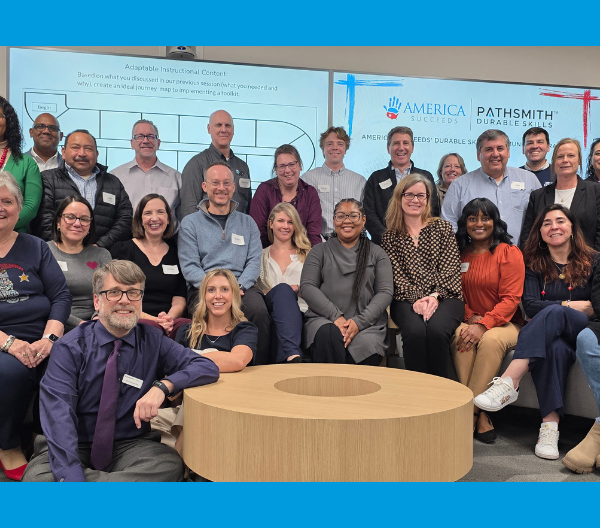With today’s rapid pace of change, the traditional metrics for hiring – degrees and course credits – no longer suffice as sole indicators of a candidate’s capability. The modern workforce demands a more nuanced approach, one that values skills and competencies over formal qualifications that can be taught. Enter Skills-Based Hiring (SBH), a strategy that not only enhances organizational outcomes but also fosters a more resilient and diverse workforce.
Defining Skills-Based Hiring
SBH is a transformative approach to recruitment and employee selection that prioritizes a candidate’s specific skills and abilities over traditional credentials such as degrees, diplomas, or work history. This method focuses on the competencies and capabilities that are directly relevant to the job at hand, offering a more inclusive and equitable method for identifying talent.
Core Principles of Skills-Based Hiring
Curious what the core principles of SBH include? We have you covered:
- Competency Over Credentials: SBH emphasizes the importance of what candidates can do, rather than where they learned to do it. This shift away from credentialism opens opportunities for individuals who have acquired skills through non-traditional paths, including self-study, vocational training, or real-world experience.
- Diverse Talent Pool: By valuing skills and competencies, employers tap into a broader and more diverse talent pool. This approach helps mitigate biases associated with educational pedigree or career gaps, fostering a more inclusive workforce.
- Alignment with Business Goals: By focusing on the specific skills needed for success in a role, SBH aligns hiring practices with business objectives. This ensures that new hires are well-equipped to contribute to organizational goals from day one.
- Enhanced Employee Engagement and Retention: Candidates hired based on their skills and fit for the job are more likely to be engaged and satisfied in their roles. This alignment can lead to higher job performance, greater job satisfaction, and improved retention rates.
Why Skills-Based Hiring Matters
In the face of rapid technological advancement and changing workforce dynamics, SBH offers a forward-thinking solution that meets the needs of both employers and job seekers. It recognizes the value of lifelong learning and adaptability, highlighting the importance of Durable Skills that remain relevant as industries evolve.
For businesses, adopting an SBH approach is a strategic imperative to stay competitive in the modern economy. For example, a study by Harvard Business Review found that diverse teams make better business decisions 87% of the time compared to homogeneous teams. And, companies with diverse executive teams outperform their less diverse counterparts by an astounding 25% in terms of profitability (McKinsey & Company). It’s also been shown that if organizations implement processes to support Black, Hispanic, and low-income students in postsecondary degree or certificate attainment, tax revenue from boosted wages would increase by $956 billion per year.
In embracing SBH, we move toward a more equitable and efficient labor market, where candidates are recognized based on their unique skills, experiences, and potential contributions to the workplace. In particular, by emphasizing and cultivating durable skills – critical thinking, problem-solving, adaptability, and collaboration – rather than relying on a limited pipeline of elite institution graduates, organizations can build a diverse, dynamic, and high-performing workforce that drives productivity and fosters innovation.
Why Aren’t More Companies Using Skills-Based Hiring?
By focusing on the skills and abilities that are directly relevant to job performance, organizations unlock a wealth of benefits. Across the United States, a growing number of states are recognizing the value of SBH. With 21 states, including Massachusetts, Colorado, and Utah to name a few, moving toward SBH for state-level jobs, the movement is gaining momentum.
Despite the increasing recognition that degrees inaccurately gauge Durable Skill competency, employers continue facing challenges in shifting away from traditional credential-based hiring methods. In 2021, The Burning Glass Institute and Harvard Business School estimated shifts to SBH practices translated to new opportunities for fewer than 1 in 700 hires, a marginal impact for non-bachelor’s degree holders.
Employers struggle with shifting to SBH for the following reasons:
- The lack of a common lexicon: The absence of a unified vocabulary around Durable Skills creates confusion about how these skills are perceived and utilized in different contexts.
- Inability to assess skills: Without a common understanding, Durable Skills have been viewed as subjective and challenging to measure effectively.
- Complexity in changing systems: The resource-intensive nature of updating systems, including skills assessment, data management, and upskilling/development programs, further hinders the adoption of SBH practices.
How the Durable Skills Advantage Framework Can Advance Momentum Towards Skills-Based Hiring
This is where the Durable Skills Advantage Framework comes into play. By providing an explicit understanding of Durable Skills, the Durable Skills Advantage Framework can help ensure hiring is aligned with the competencies that truly matter for success in the modern economy.
Since the launch of the Durable Skills Advantage Framework on January 17, 2024, America Succeeds has witnessed an enthusiastic reception, marked by over 800 unique downloads of the Framework. This surge of interest underscores the Framework’s potential to redefine how Durable Skills are integrated across various educational and workforce contexts.
Conversations with prospective partners are showing a spectrum of promising applications, especially in ways that could advance the use of SBH practices. For example, there’s a growing intrigue from organizations aiming to bolster their competency libraries with the Framework’s definitions, alongside credential issuers exploring micro-credentials in Durable Skills development.
Think about a company like SmartResume, a digital talent marketplace that provides job seekers with a tool to store information about their academic and professional experiences, skills, abilities, and credentials. By aligning their platform with the Framework, users could highlight and demonstrate their Durable Skills more effectively. This would enhance the visibility of candidates’ skill sets, allowing employers to make more informed, skill-based hiring decisions. Using the Framework would also help to align candidates’ skills with job roles, streamlining the recruitment process and saving employers time and resources.
How You Can Start Supporting Skills-Based Hiring in Your Work
We invite businesses, HR leaders, and workforce agencies to join us in championing skills-based hiring by implementing the Durable Skills Advantage Framework within your four walls. Together, we can build a workforce that is not only more skilled and adaptable but also more reflective of the diverse talents that define our society.
As we look towards the future, embracing SBH is not just a strategic choice – it’s a necessary evolution. By prioritizing skills and competencies, organizations can navigate the challenges and opportunities of the modern world with confidence. Let’s lead the charge in making the workforce of tomorrow more inclusive, dynamic, and resilient.
To learn more about our work or for questions about the Durables Skills Advantage Framework, please get in touch with the America Succeeds team at info@americasucceeds.org.




